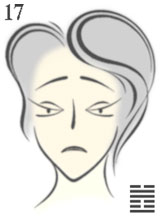
Hexagram Yi-King 17.
Gallery of logic facial emotions.

If you investigate occult philosophical theories and esoteric systems of
knowledge then you can correlate concepts of mystical occultism to features of a
human face and symbols of emotional conditions in this online gallery. Namely as
philosopher you can consider facial features and physiognomy of human emotions
as a logic basis for creation of mental associations between psychic processes
and ideas of occult philosophy.
And also if you study classical philosophy then can consider physiognomy of
facial emotions as a logic basis for creation of mental associations between
psychic processes and philosophical ideas.
Actually features of a face and images of emotions are identical to hexagrams of
the canon of changes Yi-King, and consequently can be used for comparison of
various philosophical concepts with mental processes, that corresponds to the
occult hermetic principle of mystical similarity between diverse phenomena of
the world validity.
-
Features of a face and associations of emotional conditions.
Eyebrows: dreams cannot be actual / unfeasible imagination.
Eyes: relevant world vision / illusions are probable.
Mouth: feelings cannot be valid / sensations have no verification by reality.
If feelings are not confirmed by reality and dreams cannot be possible then false illusions are carried out in the world.
Formulas of analytical philosophy.
1 (eyes) planned opportunity is (eyebrows) doubtful
probability of (mouth) impracticable event.
2 (eyebrows) fictitious ideas are (eyes) guessed
prototypes of (mouth) non cognizable world.
3 (eyebrows) limited knowledge is (eyes) deliberate
reflections of (mouth) erroneous reality.
4 (eyebrows) inadequate imaginations are (eyes)
acceptable anticipations of (mouth) false validity.
-
Following 18 symbol of physiognomy.
About philosophical concepts of mystical occultism and psychic processes of facial features,
and also scientific knowledge about languages.